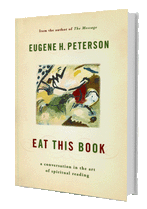
Eugene Peterson has a volume entitled “Eat this Book” and it has inspired me to rethink each of my models. The title of his book refers to the revelation of John in Revelations 10:9-10 where an angel of the Lord hands him a scroll and says “Take it and eat it. It will turn your stomach sour, but in your mouth it will be as sweet as honey.” Peterson explains that this is an adequate metaphor for how we should be reading the Bible; we must ingest it in its entirety. He says “It takes the whole Bible to read any part of the Bible. Every sentence is embedded in story and can no more be understood accurately or fully apart from the story than any one of our sentences spoken throughout the course of the day can be understood apart from our relationships and culture and the various ways in which we speak to our children and parents, our friends and enemies, our employers and employees – and our God.”
We have a tendency to take the pieces of scripture that we like, or the ones that are easily understood, and apply them to our lives. If what we believe is that scripture is inspired by God, then we need to take every word seriously. I’m not saying that every word needs to be taken literally, or that every part of the Bible is written in the same literary genre. What I am saying is that if the Bible is the inspired word of God, then the whole Bible is important and worthy of deep thought, study, and most importantly application.
In this light, my various understandings or explanations of Christian education all hold merit. Individually, though, they all come up short. Each one explains something of an understanding of a Bible-based schooling model, but if the whole story of scripture is not reflected in this understanding then it continues to fall short. The challenge for Christian education and Christian educators is to ensure that how we regard each child, how we design curriculum, how we manifest the Body of Christ in community, etc., reflect an understanding of God’s work in Creation founded in a reading of scripture that “enters our souls as food enters our stomachs, spreads through our blood, and becomes holiness, and love, and wisdom” (4).
The Bible is not just a book that we study, nor is it a source of verses which can be dismembered and used sparingly where appropriate. The Bible is the story of God, meant to be eaten and assimilated into “the tissues of our lives” (20).
Peterson, Eugene H.. Eat this book: a conversation in the art of spiritual reading. Grand Rapids, Mich.: W.B. Eerdmans Pub. Co., 2006.

 RSS Feed
RSS Feed
